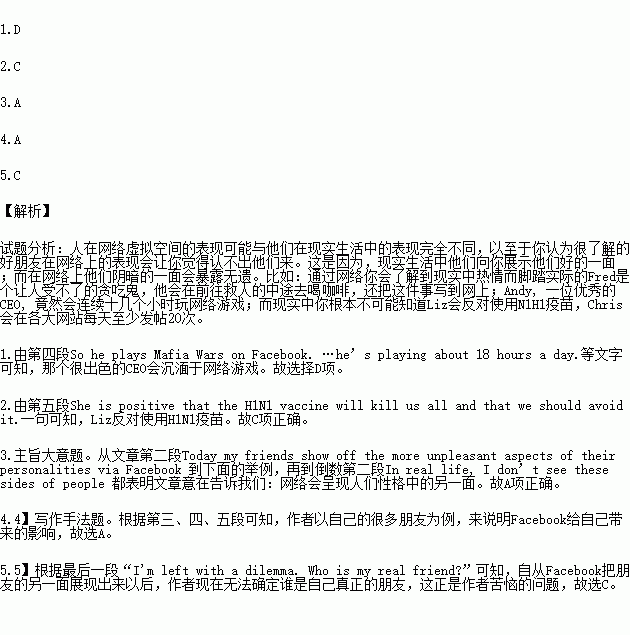题目内容
阅读理解。
I’m not so sure I like my friends any more. I used to like them — to be honest. We’d have lunch, talk on the phone or exchange e-mails, and they all seemed normal enough. But then came Facebook and I was introduced to a sad fact: many of my friends have dark sides that they had kept from me.
Today my friends show off the more unpleasant aspects of their personalities via Facebook. No longer hidden, they’re thrown in my face like TV commercials — unavoidable and endless advertisements for the worst of their personalities.
Take Fred. If you were to have lunch with him, you’d find him warm, and down-to-earth. Read his Facebook and you realize he’s an unbearable, food-obsessed bore. He’d pause to have a cup of coffee on his way to save a drowning man — and then write about it.
Take Andy. You won’t find a smarter CEO anywhere, but now he’s a CEO without a company to lull. So he plays Mafia Wars on Facebook. He’s doing well — level 731. Thanks to Facebook, I know he’s playing about 18 hours a day. Andy, you’ve run four companies — and this is how you spend your downtime? What happened to golf? What happened to getting another job?
Take Liz. She is positive that the H1N1 vaccine will kill us all and that we should avoid it. And then comes Chris who likes to post at least 20 times a day on every website he can find, so I get to read his thoughts twice, once on Facebook and once on Twitter.
In real life, I don’t see these sides of people. Face to face, my friends show me their best. They’re nice, smart people. But face to Facebook, my friends are like a blind date which goes horribly wrong.
I’m left with a dilemma. Who is my real friend? Is it the Liz I have lunch with or the anti-vaccine lunatic(狂人)on Facebook? Is it the Fred I can grab a sandwich with or the Fred who weeps if he’s at a party and the wine isn’t up to his standards?
1. What’s Andy probably busy in doing now?
A. He’s running his company.
B. He’s playing golf all day.
C. He’s looking for another job.
D. He’s playing computer games.
2. Who is opposed to the H1N1 vaccine in the text?
A. Fred. B. Andy.
C. Liz. D. Chris.
3. According to the text, Facebook tends to ______.
A. present another side of people
B. offer some food for free
C. show endless advertisements
D. get you to more parties
4. The text is developed mainly by ______.
A. giving examples B. following the time order
C. listing figures D. raising questions
5. The author focuses on the question of ______.
A. what is Facebook B. what happened to golf
C. who is my real friend D. who can help me

